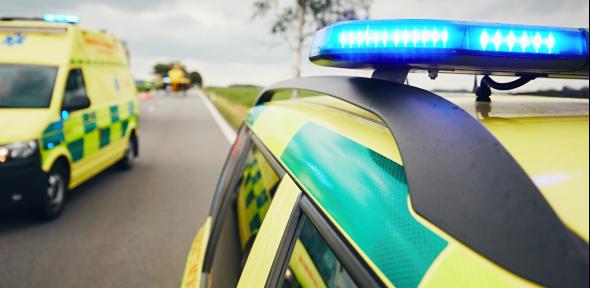Institute of Continuing Education (ICE)

Submitted by Amy Kingham on Mon, 21/12/2020 - 16:49
The events of 2020 have brought home the importance of ensuring healthcare professionals have access to evidence-based knowledge and skills. Running once again from January 2021, ICE’s Postgraduate Certificate in Advanced Clinical Practice (Pre-Hospital Emergency Medicine) aims to give registered nurses and paramedics the opportunity to develop their expertise, as well as their careers. Academic Director, Dr Tom Monie, tells us more.
"Pre-Hospital Emergency Medicine (PHEM) is when, for example, paramedics attend a road traffic accident or a heart attack. It’s dealing with crisis points where there isn’t necessarily time to get people to hospital before providing some form of treatment. That might mean pain management, controlling excess blood loss or setting broken bones before transportation to a hospital.
“The paramedics and nurses on our PHEM course might have 10 plus years of hands-on experience, so they’re the people their colleagues turn to, but historically, there wasn’t strong post-registration qualification-based progression routes for them. That’s changed over the last few years, and they’re now required to develop their skills. Advanced Clinical Practice gives students the knowledge and confidence to take more leadership in clinical teams, often at times when fast action is critical. It also opens opportunities for greater specialism and additional qualifications, such as in high-impact trauma, the treatment of strokes, or being able to prescribe certain drugs. It’s a route for career progression.
“The course content is a mixture of theory and practice. In 2021, we’ll need to be flexible in our delivery. With set readings, activities and pre-recorded lectures, students can be flexible about study times, and tutors will host live, online workshops for the group. Some elements of clinical demonstration still need to be in-person, but they’ll be socially distanced and in PPE – something these students are used to anyway. Madindgley Hall is a COVID-secure training venue.
“That practical element is one of the big advantages of the ICE course. Of the few other programmes around, many are fully online and tend to focus on specific, more limited areas, whereas this course covers a greater breadth of content. There are excellent peer-learning benefits too. All the students have seen and experienced different things in their careers, and in their clinical environments, they’re used to talking through what’s happened. The teaching here builds on the experience-sharing that paramedics and nurses are familiar with.
“Perhaps now more so than ever, ongoing professional development is reshaping all sectors, including healthcare, and leading more people to change jobs or require additional qualifications. Learning new skills, staying up-to-date and taking extra training prepares people for new roles and career progression. This course helps a vital group of clinical professionals, critical to our society, be ready for their fast-changing workplace.
Find out more about the Postgraduate Certificate in Advanced Clinical Practice.
------
This article was originally published in the Lent - Easter 2021 issue of Inside ICE.